
2011 Density Functional Theory Workshop, July 23-27
Complete Program (PDF) |
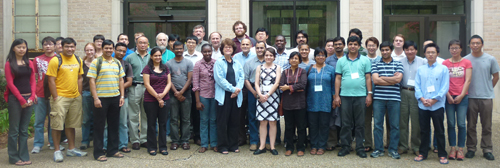
(Large version 1, large version 2)
Link to Photos
Link to recorded lectures: Slides and videos
The LONI Institute, with LSU's Center for Computation & Technology and High Performance Computing, hosted their first Workshop on Density Functional Theory (DFT), July 23-27, 2011 on LSU's campus.
This educational workshop exposed graduate students and postdocs to several flavors of electronic structure calculations in a holistic way. The workshop was accessible to graduate students and postdocs in condensed matter physics, chemistry, and materials engineering, who may not have prior knowledge of DFT methods.
Invited speakers were
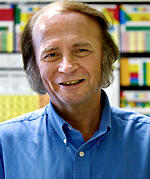 |
John P. Perdew is a Professor of Physics at Tulane University. His research in the density-functional theory of electronic structure has helped to establish this theory as the most widely-used method to predict the properties of atoms, molecules, and solids from the principles of quantum mechanics. He has published 250 research articles and his work has been cited 76,000 times. He is an elected Fellow of the American Physical Society, and an elected member of the International Academy of Quantum Molecular Science and the National Academy of Sciences (U.S.). Born in 1943 in western Maryland, Perdew received a B.S. in Physics and Mathematics from Gettysburg College in 1965, and a Ph.D. in Physics from Cornell University in 1971. After postdoctoral work at the University of Toronto and Rutgers University, he joined the Department of Physics at Tulane University in 1977, was promoted to full professor in 1982, and served two terms as Department Chair. His research has been supported by the NSF since 1978. |
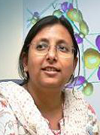 |
Prof. Tanusri Saha-Dasgupta received her PhD from Calcutta University in 1995. She did post-doctoral research at ONERA in Paris, University of Cergy-Pontoise in Paris and the Max-Planck Institute for Solid State Physics in Stuttgart. She joined the Indian Institute of Science, Bangalore as a research associate in 1999 and moved to the S.N. Bose National Centre for Basic Sciences as a faculty member in 2000. She is currently a Professor in the Department of Material Science and also the head of the Advanced Materials Research Unit. Her expertise is in electronic structure of complex materials, strongly correlated electron systems, phase stability in disordered alloys and electronic structure of nanomaterials. She has received the Swarnajayanti fellowship in 2006, has been appointed the head of Max-Planck partner group in 2005. She is a fellow of the Indian Academy of Sciences and the National Academy of Sciences, India. |
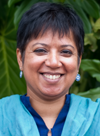 |
Prof. Shobhana Narasimhan received a M.Sc. at the Indian Institute of Technology, Bombay, India, 1985, an A.M. at Harvard University, 1988, and a Ph.D. at Harvard University, 1991 with Professor David Vanderbilt. She hold postdoctoral appointments at Brookhaven National Lab and the Fritz-Haber-Institute in Berlin. Since 1996 she is on the Faculty of the Jawaharlal Nehru Centre for Advanced Scientific Research, Bangalore, India, where she is currently Professor and Chairperson of the Theoretical Sciences Unit. |
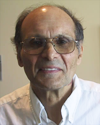 |
Prof. Mel Levy, who was born in Brooklyn, New York, in 1941, is a Visiting Professor at Duke University and a Professor Emeritus at both Tulane University and North Carolina Agricultural and Technical State University. For over thirty-five years, he has made important contributions to the foundations and mathematical structures of density-functional and density-matrix functional theories. He is an elected Fellow of the American Physical Society, and an elected member of the International Academy of Quantum Molecular Science and of the International Academy of Mathematical Chemistry. He has served on the Editorial Boards of Advances in Quantum Chemistry, Theoretical Chemistry Accounts, and Progress in Theoretical Chemistry. |
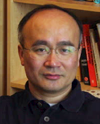 |
Prof. Weitao Yang was born in Chaozhou, China. He received his B.S. degree from Peking University and Ph.D. degree from the University of North Carolina at Chapel Hill. He is currently the Philip Handler Professor of Chemistry at Duke University. Yang's interests are in developing density functional theory and applying it to complex problems. Professor Yang has held visiting professorships from the Japanese Society for Promotion of Science, Kyoto University, and Hong Kong University, and Tsinghua University. He received the 1997 Annual Medal of the International Academy of Quantum Molecular Science, and the 2006 Humboldt Research Award for Senior U.S. Scientists. He has held Sloan fellowship, and is the co-author (with Robert G. Parr) of one of the leading textbooks on density-functional theory. He is an elected member of the International Academy of Quantum Molecular Science, http://www.IAQMS.org/, an elected fellow of American Association for the Advancement of Science and of the American Physical Society. Yang is recognized by the Institute for Scientific Information as a Highly Cited Researcher. In 2010, Yang was the International Solvay Chair in Chemistry, International Solvay Institutes for Physics and Chemistry, Brussels, Belgium. |
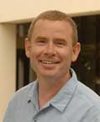 |
Kieron Burke is a professor in both the chemistry and physics departments at UC Irvine. He began his checkered academic career as a chemical engineering student at University College Dublin, but was drawn to the study of quantum mechanics by Dirac's monograph. He is one of the leading developers of density functional theory, a method for solving the Schroedinger equation for electrons that can be easily applied to molecules with hundreds of atoms which has transformed modern chemistry. His current interests include removing empiricism from the theory, the foundations of the time-dependent theory, molecular electronics, electron-atom scattering, including nuclear motion beyond Born-Oppenheimer, and open quantum systems. He has won several awards for teaching and research, and was recently elected a fellow of the American Physical Society. |
The invited speakers provided pedagogical and expository lectures on the methods that they use, complemented by hands-on sessions. The format allowed plenty of time for discussions. Gaussian09, NWCHEM, GAMESS and Quantum ESPRESSO were available to the participants during the workshop.
Who: Students, postdocs, faculty, and staff at Grambling State University, Louisiana State University, Louisiana Tech University, Southern University at Baton Rouge, Tulane University, University of Louisiana at Lafayette, University of New Orleans, and Xavier University of Louisiana, were invited to participate.
Where: Training room of Johnston Hall, room 338, LSU campus.
Participants were expected to know basic linux, but they were brought up to speed by taking the online courses "Intro to HPC", "Remote Access with SSH", and "Survival Skills with the BASH Shell" at https://docs.loni.org/moodle/ .
Registration: $125.00. Participants covered their own transportation, and/or lodging costs. Continental breakfast, lunch and refreshments were provided each day.
Conference Organizers:
Juana Moreno, Louisiana State University, moreno AT lsu.edu
John Perdew, Tulane University, perdew AT tulane.edu
Ramu Ramachandran, Louisiana Tech University, ramu AT latech.edu
Randall Hall, Louisiana State University, rhall AT lsu.edu
Other information:
About LSU: http://www.lsu.edu/visitors/images/thingstodo.pdf
About Baton Rouge: http://www.visitbatonrouge.com
LSU campus map: http://psaf-gis.lsu.edu/campusmap/
LSU visitor parking map: https://sites01.lsu.edu/wp/parking/files/2011/06/VC_parking_map_FINAL2.pdf
For more information, please contact Leigh Townsend at lgalat1-at-tigers.lsu.edu.